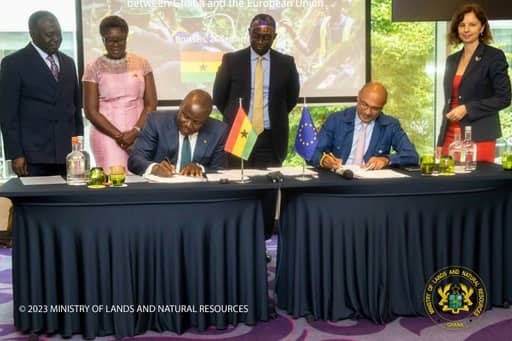Ghana is on the verge of becoming the inaugural African nation to issue Forest Law Enforcement Governance and Trade (FLEGT) licenses.
This monumental achievement is expected to be finalized in 2024. It came on the back of the 11th Joint Monitoring and Review Mechanism (JMRM) meeting held between Ghana and the European Union (EU) in Brussels.
Ghana’s imminent issuance of FLEGT licenses represents a significant stride forward in responsible forest resource management and legal timber trade. Once fully operational, the Timber Legality Assurance System will mark the culmination of over a decade of rigorous institutional and regulatory reforms.
This achievement follows Ghana’s pioneering move in 2009 when it became the first timber-producing country to sign a Voluntary Partnership Agreement (VPA) with the EU. The VPA laid the groundwork for Ghana’s journey towards FLEGT licensing.
A FLEGT license serves as an export permit issued by a VPA partner nation for timber and related products bound for the EU market, certifying their legal origin. Importantly, such products automatically comply with the EU Timber Regulation (EUTR), reinforcing the prohibition of illegally harvested timber and related items in the EU market.
The high-level delegation led by the Minister for Lands and Natural Resources, Samuel Jinapor, included representatives from various sectors, such as the Ministry of Lands and Natural Resources, the Parliamentary Select Committee on Lands and Forest, and key stakeholders.
The gathering at the 11th JMRM meeting aimed to finalize procedural steps leading to the issuance of FLEGT licenses.
This achievement holds global significance in the fight against illegal timber trade, reflecting a commitment to improved forest governance. The JMRM session, the first since May 2019 and the first to be convened outside Ghana, involved a thorough review of the Agreement’s implementation status.
The parties involved also established a Joint Action Plan for FLEGT licensing and addressed procedural matters that need resolution before licenses can be issued. These licenses will bear witness to the legality of country’s timber trade, facilitating commerce for both exporters and importers.
The impending FLEGT licensing follows in the footsteps of Indonesia, which became the first country globally to issue such licenses in 2016. This progress underscores the dedication to sustainable forest management and the fight against illegal logging.
Ghana has undertaken substantial legislative reforms in its forestry sector to bolster forest governance, aligning with the VPA objectives and its commitment to sustainable forest management and climate change mitigation.
Additionally, efforts continue to tackle illegal timber trade in domestic and regional markets through a tracking system that demands proof of legality throughout the supply chain.
The VPA between Ghana and the EU plays a vital role in controlling illegal timber trade, modernizing timber operations, and promoting social benefits such as community payments through Social Responsibility Agreements.
Mr. Jinapor emphasized that the country’s commitment to the VPA, the impending issuance of FLEGT licenses, and the stringent legality standards will further consolidate efforts toward sustainable forest management.
The historic moment in the country’s forestry sector comes after 14 years of dedicated efforts, culminating in readiness for FLEGT licensing. It not only represents a monumental achievement for Ghana but also stands as an exemplar of international cooperation in addressing global challenges such as deforestation and illegal logging.
The positive impact on Ghana’s timber industry and the environment is highly anticipated, demonstrating the power of partnerships and persistent endeavors in driving meaningful change.
Forest sector officials say they remain steadfast in the commitment to sustainable forest management and the reversal of forest loss and land degradation by 2030.





